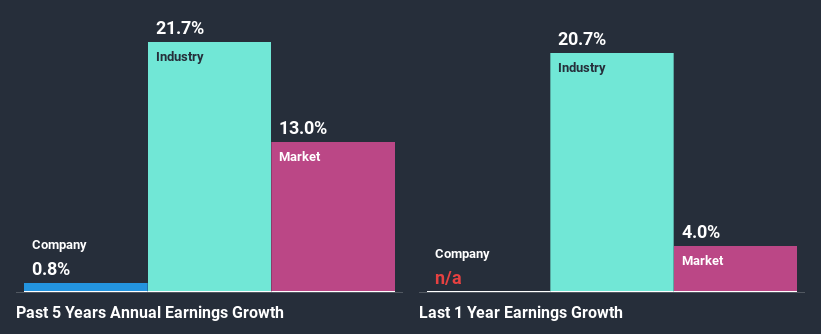- Canada
- /
- Renewable Energy
- /
- TSXV:RE
RE Royalties Ltd.'s (CVE:RE) On An Uptrend But Financial Prospects Look Pretty Weak: Is The Stock Overpriced?
RE Royalties (CVE:RE) has had a great run on the share market with its stock up by a significant 27% over the last three months. We, however wanted to have a closer look at its key financial indicators as the markets usually pay for long-term fundamentals, and in this case, they don't look very promising. Particularly, we will be paying attention to RE Royalties' ROE today.
Return on equity or ROE is a key measure used to assess how efficiently a company's management is utilizing the company's capital. In other words, it is a profitability ratio which measures the rate of return on the capital provided by the company's shareholders.
See our latest analysis for RE Royalties
How Is ROE Calculated?
The formula for return on equity is:
Return on Equity = Net Profit (from continuing operations) ÷ Shareholders' Equity
So, based on the above formula, the ROE for RE Royalties is:
1.3% = CA$226k ÷ CA$17m (Based on the trailing twelve months to September 2020).
The 'return' is the profit over the last twelve months. So, this means that for every CA$1 of its shareholder's investments, the company generates a profit of CA$0.01.
What Is The Relationship Between ROE And Earnings Growth?
So far, we've learned that ROE is a measure of a company's profitability. We now need to evaluate how much profit the company reinvests or "retains" for future growth which then gives us an idea about the growth potential of the company. Assuming everything else remains unchanged, the higher the ROE and profit retention, the higher the growth rate of a company compared to companies that don't necessarily bear these characteristics.
RE Royalties' Earnings Growth And 1.3% ROE
It is hard to argue that RE Royalties' ROE is much good in and of itself. Even when compared to the industry average of 8.4%, the ROE figure is pretty disappointing. Therefore, RE Royalties' flat earnings over the past five years can possibly be explained by the low ROE amongst other factors.
We then compared RE Royalties' net income growth with the industry and found that the company's growth figure is lower than the average industry growth rate of 22% in the same period, which is a bit concerning.

Earnings growth is an important metric to consider when valuing a stock. The investor should try to establish if the expected growth or decline in earnings, whichever the case may be, is priced in. By doing so, they will have an idea if the stock is headed into clear blue waters or if swampy waters await. If you're wondering about RE Royalties''s valuation, check out this gauge of its price-to-earnings ratio, as compared to its industry.
Is RE Royalties Efficiently Re-investing Its Profits?
RE Royalties has a LTM (or last twelve month) payout ratio as high as 573% meaning that the company is paying a dividend which is beyond its means. The absence in growth is therefore not surprising. Its usually very hard to sustain dividend payments that are higher than reported profits. That's a huge risk in our books. Our risks dashboard should have the 6 risks we have identified for RE Royalties.
Only recently, RE Royalties started paying a dividend. This means that the management might have concluded that its shareholders prefer dividends over earnings growth.
Summary
In total, we would have a hard think before deciding on any investment action concerning RE Royalties. The low ROE, combined with the fact that the company is paying out almost if not all, of its profits as dividends, has resulted in the lack or absence of growth in its earnings. Until now, we have only just grazed the surface of the company's past performance by looking at the company's fundamentals. So it may be worth checking this free detailed graph of RE Royalties' past earnings, as well as revenue and cash flows to get a deeper insight into the company's performance.
If you decide to trade RE Royalties, use the lowest-cost* platform that is rated #1 Overall by Barron’s, Interactive Brokers. Trade stocks, options, futures, forex, bonds and funds on 135 markets, all from a single integrated account. Promoted
New: AI Stock Screener & Alerts
Our new AI Stock Screener scans the market every day to uncover opportunities.
• Dividend Powerhouses (3%+ Yield)
• Undervalued Small Caps with Insider Buying
• High growth Tech and AI Companies
Or build your own from over 50 metrics.
This article by Simply Wall St is general in nature. It does not constitute a recommendation to buy or sell any stock, and does not take account of your objectives, or your financial situation. We aim to bring you long-term focused analysis driven by fundamental data. Note that our analysis may not factor in the latest price-sensitive company announcements or qualitative material. Simply Wall St has no position in any stocks mentioned.
*Interactive Brokers Rated Lowest Cost Broker by StockBrokers.com Annual Online Review 2020
Have feedback on this article? Concerned about the content? Get in touch with us directly. Alternatively, email editorial-team@simplywallst.com.
About TSXV:RE
RE Royalties
Engages in the acquisition of revenue-based royalties from renewable energy and clean technology companies by providing a non-dilutive royalty financing solution to privately held and publicly traded companies.
Slight risk with mediocre balance sheet.
Market Insights
Community Narratives


Recently Updated Narratives

Constellation Energy Dividends and Growth

CoreWeave's Revenue Expected to Rocket 77.88% in 5-Year Forecast

Bisalloy Steel Group will shine with a projected profit margin increase of 12.8%
Popular Narratives


MicroVision will explode future revenue by 380.37% with a vision towards success


NVDA: Expanding AI Demand Will Drive Major Data Center Investments Through 2026



